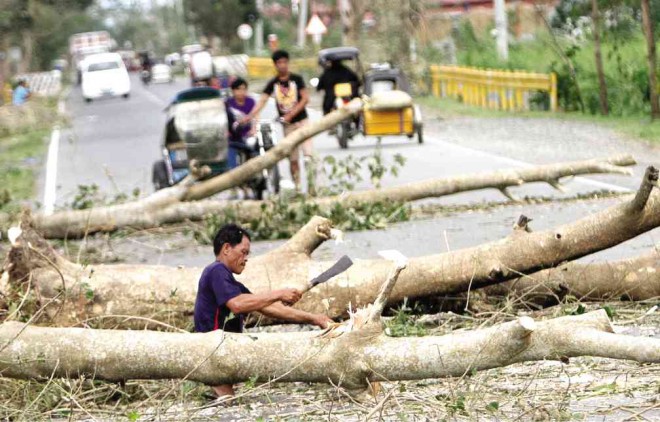
A MAN chops off a fallen tree along the national highway in the boundary of Tarlac and Nueva Ecija due to heavy winds spawned by Typhoon ‘Santi.’ RICHARD A. REYES
Herminia Garote was born in La Paz town in Tarlac province 57 years ago. Her husband is a farmer who tills a small piece of land. Together, they have raised seven children and five grandchildren.
One night in October, Typhoon “Santi” slammed into Tarlac and flattened their house. Luckily, they were able to seek shelter in a neighbor’s house, escaping the typhoon’s wrath.
Although sad because the typhoon destroyed their house, Garote was thankful that no family member was hurt.
It was a trying time for the Garotes but their ordeal has not gone unnoticed.
On Nov. 26, Garote and her family, along with 375 others from remote communities in Tarlac, were gathered by government soldiers bearing, not arms, but gifts of food and livelihood.
Personnel of the military’s Tarlac City-based Northern Luzon Command (Nolcom), the Mechanized Infantry Division, 7th Infantry Division, 703rd Infantry Brigade and 3rd Mechanized Infantry Battalion brought with them bags of groceries, seedlings and catfish (hito).
The soldiers even prepared a program, complete with dance numbers, to entertain the villagers.
Lt. Gen. Gregorio Pio Catapang Jr., Nolcom commander, said the gifts were all grown and harvested in military camps under his command.
At Camp Aquino in Tarlac City, papaya trees abound throughout the reservation, he said. At Camp O’Donnell in Capas town, boer and anglo-nubian goats are raised.
In another camp, soldiers grow catfish. The soldiers distributed around 3,500 kg of catfish to those hardest hit by the typhoon, including the Garote family.
In San Jose town, soldiers helped the Aeta community in producing organic rice.
“As soldiers, we have sworn to protect the people. But wherever we are assigned, we do our best not only to protect the people but to provide for them as well,” Catapang said. “We want the people to know that soldiers can be depended on in times of war and … peace.”
New enemy
He said the military is now coming to grips with a new kind of enemy.
“Climate change is the new war. As soldiers, we cannot fight the force of nature. In a matter of minutes, it can wipe out an entire city. The time has come for us to shift our focus on climate change. It’s time for us to come together and fight this war as one,” he said.
Like the rest of the world, Catapang has seen how Supertyphoon “Yolanda” brought provinces in Eastern Visayas to their knees.
Asked how prepared Tarlac is for a similar scenario, he said: “We hope it will never happen here. But … we have requested the barangay (village) captain to pass a resolution that will enable the construction of a permanent evacuation site, preferably with concrete roofs.”
Such a site already exists in Paniqui town. Along with the creation of permanent evacuation sites, building a warehouse to store food is necessary, Catapang said.
“The 7th ID’s role in national emergencies is crucial. We can create a warehouse of food here so as to maintain food security in times of natural disasters. This warehouse will contain rice, food and other essential relief supplies,” he said.
Furniture
The military camps were not spared from Santi, he said. Strong winds knocked down most of the trees. But instead of turning them into firewood, the soldiers decided to turn these into furniture.
Catapang said they planned to sell the furniture and use the earnings to contribute to the rehabilitation efforts in Eastern Visayas.
In December 2011, the soldiers partnered with the Tarlac Heritage Foundation (THF) to distribute rice, biscuits, canned goods and vegetable seedlings to indigent families.
The military and its partners hope that these families would learn to sustain themselves.
“We want them to have food on the table not only during Christmas but for the rest of the year as well,” said Dr. Isa Cojuangco Suntay, head of the THF.
The families received pechay, okra, tomato and sweet potato seedlings. They were also taught the proper way to cook rice to avoid wasting grains.
By the end of the month, the soldiers would have reached out to about 3,500 indigent families.